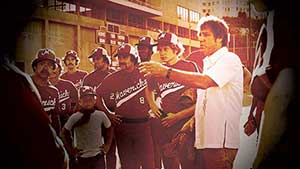In the Netflix documentary about the legendary Portland Mavericks, The Battered Bastards of Baseball, we see scratchy footage of you catering to the players, managing equipment and egos, and generally running your butt off. I wonder, was it this early commitment to multi-tasking that prepared you for your future career as an Oscar nominated filmmaker? You've worked with some of the greats: Stanley Kubrick, Woody Allen, Bing Russell. Sure, some might not think Bing Russell belongs on that list. His own son, superstar Kurt Russell, lovingly calls him a 'plumber'; the kind of Hollywood supporting actor who went to work every day and got the job done. But many might not know that Bing gave you your first big break in the 70s, as a bat boy for his rag-tag Class A baseball team.
Your films are complex character dramas, but Bing and his Mavericks are a classic underdog story. Bing grew up in Florida, where the Yankees held spring training. He hung around the field and quickly became a favourite of stars like Lefty Gomez and Joe DiMaggio. As an adult, Bing moved his young family to Hollywood where he became a utility player alongside box office titans like John Wayne, and Steve McQueen. For thirteen years he played Deputy Clem Shepherd in Bonanza until the series ended. But baseball was always his obsession, so when Portland Oregon's farm team moved out in 1972, Bing decided to build an independent baseball team there from the ground up.
The Mavericks were a joke right from the start, holding open try-outs for any schlub willing to drag himself to the diamond. Footage shows three hundred or so wannabes dropping pop-flys, tripping around bases and striking out. But there you were, looking like an extra from the Bad News Bears, picking up dropped equipment, mudding balls and sprinting around the diamond. Bing called you up to his seat in the stands and told you you were hired. Among Bing's other hires that day were players who had been injured in the majors, or had been under-utilized and left to rot on farm teams. He built his team around oddballs and has-beens full of untapped potential, who just wanted another shot at playing the game they loved.
What happened next is the kind of epic rise to glory that films like The Natural and even Major League have tried to capture, but that you saw happen firsthand. It's a story that still seems unbelievable even to those that lived it. Filmmakers (and Bing's grandsons) Chapman and Maclain Way have an obvious affection for Bing, but it's the interviews from former Mavericks themselves that make this documentary more that than just a love letter to an eccentric grandad. The footage builds in such a way that it's impossible to not get caught up in the enthusiasm of a bunch of unruly players and their larger-than-life Hollywood owner defying the conventions of the uptight Minor League establishment.
Perhaps Bing's uncompromising attitude, and ability to see talent where others couldn't, influenced your decision making as director, especially in terms of casting. The big story surrounding your film Little Children was the comeback of actor Jackie Earle Haley(an original_ Bad News Bear) after years of being _persona non grata in Hollywood. You gave him a pivotal role for which he received an Oscar nomination. Rumour has it that you are even planning to give Bing and the Portland Mavericks the big screen treatment, and though it seems like a perfect fit, though I hope you resist the temptation to go as deep and dark as your other films have gone. It would be a shame to lose the kooky sense of fun that made Bing, the Mavericks, and The Battered Bastards of Baseball so enjoyable to watch.
Keep your eye on the ball,
Di






